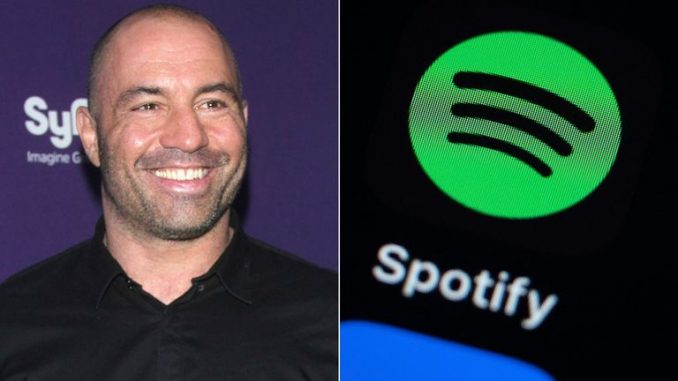
Spotify had to choose between doing the right thing or profit, and like most companies, it chose profit. Joe Rogan, the host of the platform’s #1 podcast is a huge cash cow for Spotify, but the company faced controversy as artists had their music pulled from the platform over Rogan’s promotion of COVID-19 misinformation and past use of racial slurs.
Spotify purchased the rights to Rogan’s podcast, titled “The Joe Rogan Experience,” in 2020 for upwards of $100 million. This means Rogan can only post episodes of his podcast on Spotify and the company owns his previous and future content. Rogan amasses an audience of an estimated 11 million listeners per episode and posts 3-4 episodes per week, churning out money for Spotify week after week as the service’s most popular podcast. His politics are ambiguous in that he doesn’t claim to be a Republican or Democrat, but he’s known for hating political correctness and censorship. While his audience may be large, it is also narrow and made up almost entirely of young men, many of whom idolize Rogan and take his word as gospel. Rogan is known for having a variety of different guests on his show, from academics to anti-vaxxers.
During the pandemic, Rogan, who is unvaccinated, had multiple people on the fringes of the mainstream narrative of the pandemic who spread false narratives such as the vaccine being a hoax. In December 2021, he had on Dr. Peter McCullough, who has been barred from Twitter for months and is known for promoting misinformation about COVID-19 and its vaccines, as well as for pushing the use of hydroxychloroquine as a COVID-19 treatment. During the show, McCullough claimed that hospitals receive an incentive for claiming deaths as COVID-19 related even if they weren’t and that health officials withheld treatments for COVID-19 to spread fear to make the public take the vaccine. Rogan did not dispute any of his claims. After this episode, 270 doctors and scientists wrote a letter to Spotify asking them to keep medical misinformation off the platform due to the troubling claims McCullough made on its #1 podcast.
This caught the attention of Neil Young. In January 2022, Young posted a letter to his website addressed to his manager and an executive at his record label, demanding his music be removed from Spotify because of “fake information about vaccines.”
“They can have Rogan or Young. Not both,” he wrote.
Joni Mitchell soon followed, with Crosby, Stills, Nash & Young doing the same. There was a spike of 196% traffic to the cancellation page for Spotify Premium the week of Young’s letter.
Spotify CEO Daniel Ek stated in a response, “We know we have a critical role to play in supporting creator expression while balancing it with the safety of our users. In that role, it is important to me that we don’t take on the position of being content censor while also making sure that there are rules in place and consequences for those who violate them.”
Hours after Ek’s response, Rogan uploaded an Instagram video where he expressed support for the addition of COVID-19 disclaimers for episodes that discuss COVID-19. He also apologized to the artists who pulled their music from Spotify, “I’m very sorry that they feel that way. I most certainly don’t want that.” He also added that he’s “a huge Neil Young fan.”
You may be thinking, who cares? You don’t care about streaming Young’s music, or maybe you haven’t listened to the masterpiece album that is “Blue” by Joni Mitchell. Life moves on. But the controversy surrounding Rogan did not end there.
The next artist to pull their music from the streaming service was India Arie, who cited a different reason than COVID-19 misinformation in her decision, “I have decided to pull my music and podcast from Spotify,” she wrote on Instagram. “Neil Young opened a door that I MUST walk through. I believe in freedom of speech. However, I find Joe Rogan problematic for reasons OTHER than his Covid interviews,” she added. “For me it’s also his language around race.”
Along with her statement, she posted a compilation of video clips featuring Rogan using the n-word that began to spread on social media.
Rogan later apologized, saying that the clips were “taken out of context,” because Rogan had used the word not to insult someone, but in discussions about how the word had been used by Black comedians, like Richard Pryor and Redd Foxx. He noted that “it looks f***ing horrible. Even to me … It’s not my word to use. I’m well aware of that now.”
Spotify began to take action. Seventy episodes of “The Joe Rogan Experience” were quietly removed from Spotify, with listeners speculating it was because he had said the racial slur in them. The platform added an advisory to any podcast episodes discussing the pandemic, released its internal rules on removing audio content and invested $100 million in audio content from “historically marginalized groups.”
“The fact that it’s the same dollar figure that they’re paying Rogan for exclusive rights to his content only makes it more offensive,” Bryan Reber, a professor in crisis communication leadership and public relations at the University of Georgia, stated in Time Magazine. “One guy gets $100 million for his content while many others from historically marginalized communities have to share that amount. It’s not a tit for tat situation—it seems forced and insincere.”
For all the steps Spotify took, they failed to do the most substantial one: remove Rogan from their platform.
“It shows that they care more about profits than their reputation,” says Steven Fink, a crisis consultant and author of Crisis Communications: The Definitive Guide to Managing the Message. “That’s never a good position to be in.”

